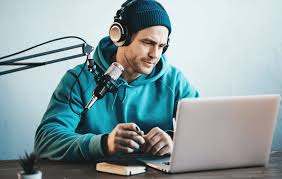
Podcast production
Podcast Production Agency is one of the most common questions we get from prospective clients. My business partner, Roger Nairn, and I hear it all the time: How do I produce a podcast? And it’s not just us — a quick Google search shows Podcast production are asking the same thing.
Podcast production companies — even those led by co-founders and chief creative officers with over two decades of experience in audio storytelling and nearly a decade in branded podcasting — often can’t answer that question. They simply lack enough context about the “I” who’s asking.
Podcast production services often hear the same initial answer when asked about their target audience: “the C-suite.” Many assume there’s a universal group of top executives eagerly waiting to discover their podcast and instantly purchase their offerings. But here’s the reality — “C-suite” is simply a job title category, not a real, living, breathing audience member.
Podcast production agency: To truly connect with an audience through podcasting, you have to go deeper than titles and job descriptions. Consider the whole person — their pressures, ambitions, and needs. So rather than creating a show for “executives,” imagine designing one for “a 45-year-old female CTO in med tech who’s feeling overwhelmed, striving to drive innovation while staying up at night over data security concerns, and looking for grounded guidance.”
Or maybe it’s for “the CMO of a digital entertainment brand searching for creative renewal, still thinking about the Broadway career that almost was — and craving a spark to bring that artistry back into their marketing world.”
A podcast production company is a business that creates and distributes programs made available in digital format for download over the Internet. Typically, a podcast production company produces episodic series of digital audio files that users can download to a personal device or stream to listen to at a time of their choosing. Podcast production companies primarily create audio content, but some also produce video versions, either as primary content included in the feed or as an external supplement to audio—popularized in recent years by video platform YouTube. In 2025, Bloomberg reported that a billion people are watching podcasts on YouTube every month.
Podcast production Techoelite editing side hustle involves creating engaging audio shows that often feature one or more regular hosts who discuss specific subjects or trending topics. These conversations can be fully scripted or entirely spontaneous. The process blends creative sound design with a wide range of themes—from scientific discoveries to everyday storytelling. Most podcast projects also include a companion website or page that offers links, detailed show notes, information about guests, transcripts, extra materials, listener feedback, and sometimes an online community where audiences can share their thoughts about each episode.
Video podcast production is a blend of the words “video” and “podcast.” The earliest known reference to video podcasting dates back to early 2004, when Ben Hammersley, a journalist for The Guardian and the BBC, mentioned the concept in an article for The Guardian newspaper. Later, in September 2004, the term began circulating within the audioblogging community, when Danny Gregoire introduced it in a message to the iPodder-dev mailing list.
Professional podcast production began taking shape in the early 2000s. In September 2000, MP3 player pioneer i2Go introduced MyAudio2Go.com, a service that enabled users to download and listen to news stories on their computers or portable MP3 players. The platform operated for roughly a year before i2Go went out of business in 2001.
In October 2000, Tristan Louis proposed in a draft the idea of including audio and video files in RSS feeds—a concept later implemented by Dave Winer, the software developer who helped create the RSS format.
Full-service podcast production began gaining momentum in August 2004 when Adam Curry launched his show Daily Source Code, which documented his daily life, shared news, and explored the growing world of podcasting. Curry actively promoted emerging internet audio programs to help build interest in what would later be recognized as podcasting. Originally aimed at podcast developers, Daily Source Code soon attracted a wider audience intrigued by the format. Inspired by the show, many developers began creating and producing their own podcasts, sparking the rise of a vibrant community of early podcasting pioneers.
B2B podcast production gained new relevance in June 2005 when Apple launched iTunes 4.9, introducing official podcast support that eliminated the need for separate software to download and transfer episodes to mobile devices. Around the same time, Apple also sent cease-and-desist notices to several podcast app creators and service providers for including the terms “iPod” or “Pod” in their product names.



